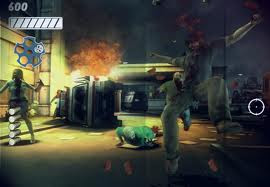RELOAD!!!!When rookie AMS Special Agent G, who originally appeared in the first House of the Dead game of which Overkill is a prequel to, is forced to team up with loudmouthed ladies' man Isaac Washington, a Bayou City detective on a quest for revenge, blood, brains, and bodies fly. The two guys curse and shoot their way through endless zombies--actually mutants--as they chase after crime lord Papa Caesar, the man responsible for the whole mess. Along the way, you'll encounter Varla Guns, an ex-stripper with her own vendetta against the sinister villain, and blast your way through wave after wave of hilarious and terrifying mutants, including hobos, football players, rednecks, backflipping clowns, nurses, and more.
As is typical with light-gun games, the action is entirely on rails, so you don't have any real control over your path through the mutant-infested backwaters of Bayou City. You do, however, have some peripheral vision if you move your crosshairs near the edge of the screen, which helps you to pick up power-ups like grenades, health kits, golden brain collectibles, and the coveted "slow mo-fo mode," which slows time down to a crawl for maximum carnage. Each mission takes place in a specific set piece that has been cast in the grindhouse theme, from hospitals to carnivals to plantation houses, and at the end of each you'll duke it out with a freakishly large supermutant in a battle to the death.
The degree of difficulty ranges from level to level but is more often easy, especially if you've got the help of a friend thanks to the two-player co-op mode, which is very nicely set up so that a partner can join at any time. Most enemies fall to your firepower in only a few shots, and even the bosses are huge pushovers once you learn their simple and predictable patterns.
Ultimately, The House of the Dead: Overkill is incredibly fun and entertaining. With a large cast of heroes and villains, brilliant writing and voice acting, and some of the best visuals available on the system, I would say that Overkill is one game that no one who likes this kind of gameplay should miss.
As is typical with light-gun games, the action is entirely on rails, so you don't have any real control over your path through the mutant-infested backwaters of Bayou City. You do, however, have some peripheral vision if you move your crosshairs near the edge of the screen, which helps you to pick up power-ups like grenades, health kits, golden brain collectibles, and the coveted "slow mo-fo mode," which slows time down to a crawl for maximum carnage. Each mission takes place in a specific set piece that has been cast in the grindhouse theme, from hospitals to carnivals to plantation houses, and at the end of each you'll duke it out with a freakishly large supermutant in a battle to the death.
The degree of difficulty ranges from level to level but is more often easy, especially if you've got the help of a friend thanks to the two-player co-op mode, which is very nicely set up so that a partner can join at any time. Most enemies fall to your firepower in only a few shots, and even the bosses are huge pushovers once you learn their simple and predictable patterns.
Ultimately, The House of the Dead: Overkill is incredibly fun and entertaining. With a large cast of heroes and villains, brilliant writing and voice acting, and some of the best visuals available on the system, I would say that Overkill is one game that no one who likes this kind of gameplay should miss.










